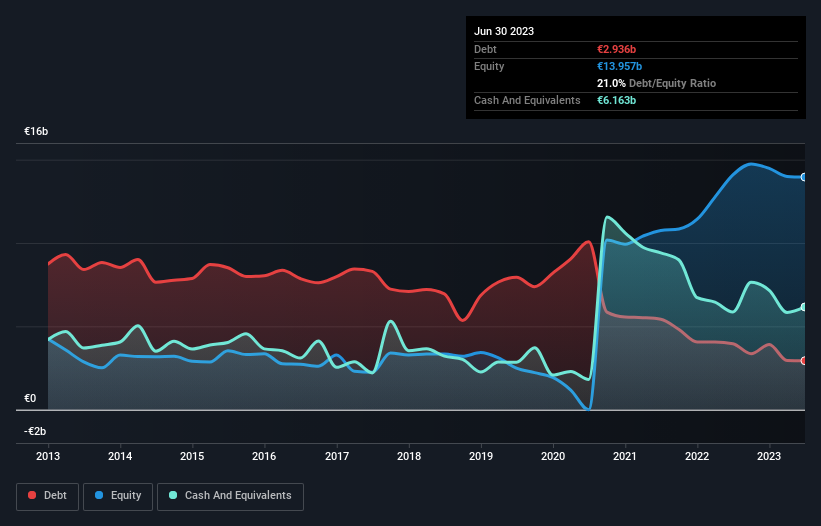- Germany
- /
- Metals and Mining
- /
- XTRA:TKA
These 4 Measures Indicate That thyssenkrupp (ETR:TKA) Is Using Debt Extensively
Howard Marks put it nicely when he said that, rather than worrying about share price volatility, 'The possibility of permanent loss is the risk I worry about... and every practical investor I know worries about.' It's only natural to consider a company's balance sheet when you examine how risky it is, since debt is often involved when a business collapses. We note that thyssenkrupp AG (ETR:TKA) does have debt on its balance sheet. But is this debt a concern to shareholders?
When Is Debt Dangerous?
Debt is a tool to help businesses grow, but if a business is incapable of paying off its lenders, then it exists at their mercy. If things get really bad, the lenders can take control of the business. However, a more frequent (but still costly) occurrence is where a company must issue shares at bargain-basement prices, permanently diluting shareholders, just to shore up its balance sheet. By replacing dilution, though, debt can be an extremely good tool for businesses that need capital to invest in growth at high rates of return. When we think about a company's use of debt, we first look at cash and debt together.
View our latest analysis for thyssenkrupp
What Is thyssenkrupp's Debt?
As you can see below, thyssenkrupp had €2.94b of debt at June 2023, down from €3.96b a year prior. However, it does have €6.16b in cash offsetting this, leading to net cash of €3.23b.

How Healthy Is thyssenkrupp's Balance Sheet?
The latest balance sheet data shows that thyssenkrupp had liabilities of €13.3b due within a year, and liabilities of €7.71b falling due after that. Offsetting this, it had €6.16b in cash and €7.36b in receivables that were due within 12 months. So its liabilities outweigh the sum of its cash and (near-term) receivables by €7.49b.
This deficit casts a shadow over the €4.48b company, like a colossus towering over mere mortals. So we definitely think shareholders need to watch this one closely. After all, thyssenkrupp would likely require a major re-capitalisation if it had to pay its creditors today. thyssenkrupp boasts net cash, so it's fair to say it does not have a heavy debt load, even if it does have very significant liabilities, in total.
In fact thyssenkrupp's saving grace is its low debt levels, because its EBIT has tanked 75% in the last twelve months. When a company sees its earnings tank, it can sometimes find its relationships with its lenders turn sour. The balance sheet is clearly the area to focus on when you are analysing debt. But ultimately the future profitability of the business will decide if thyssenkrupp can strengthen its balance sheet over time. So if you're focused on the future you can check out this free report showing analyst profit forecasts.
Finally, a business needs free cash flow to pay off debt; accounting profits just don't cut it. While thyssenkrupp has net cash on its balance sheet, it's still worth taking a look at its ability to convert earnings before interest and tax (EBIT) to free cash flow, to help us understand how quickly it is building (or eroding) that cash balance. Over the last two years, thyssenkrupp saw substantial negative free cash flow, in total. While that may be a result of expenditure for growth, it does make the debt far more risky.
Summing Up
Although thyssenkrupp's balance sheet isn't particularly strong, due to the total liabilities, it is clearly positive to see that it has net cash of €3.23b. Unfortunately, though, both its struggle level of total liabilities and its EBIT growth rate leave us concerned about thyssenkrupp So despite the cash, we do think it carries some risks. There's no doubt that we learn most about debt from the balance sheet. However, not all investment risk resides within the balance sheet - far from it. To that end, you should be aware of the 3 warning signs we've spotted with thyssenkrupp .
At the end of the day, it's often better to focus on companies that are free from net debt. You can access our special list of such companies (all with a track record of profit growth). It's free.
New: Manage All Your Stock Portfolios in One Place
We've created the ultimate portfolio companion for stock investors, and it's free.
• Connect an unlimited number of Portfolios and see your total in one currency
• Be alerted to new Warning Signs or Risks via email or mobile
• Track the Fair Value of your stocks
Have feedback on this article? Concerned about the content? Get in touch with us directly. Alternatively, email editorial-team (at) simplywallst.com.
This article by Simply Wall St is general in nature. We provide commentary based on historical data and analyst forecasts only using an unbiased methodology and our articles are not intended to be financial advice. It does not constitute a recommendation to buy or sell any stock, and does not take account of your objectives, or your financial situation. We aim to bring you long-term focused analysis driven by fundamental data. Note that our analysis may not factor in the latest price-sensitive company announcements or qualitative material. Simply Wall St has no position in any stocks mentioned.
About XTRA:TKA
thyssenkrupp
Operates as an industrial and technology company in Germany and internationally.
Undervalued with excellent balance sheet.
Similar Companies
Market Insights
Community Narratives



